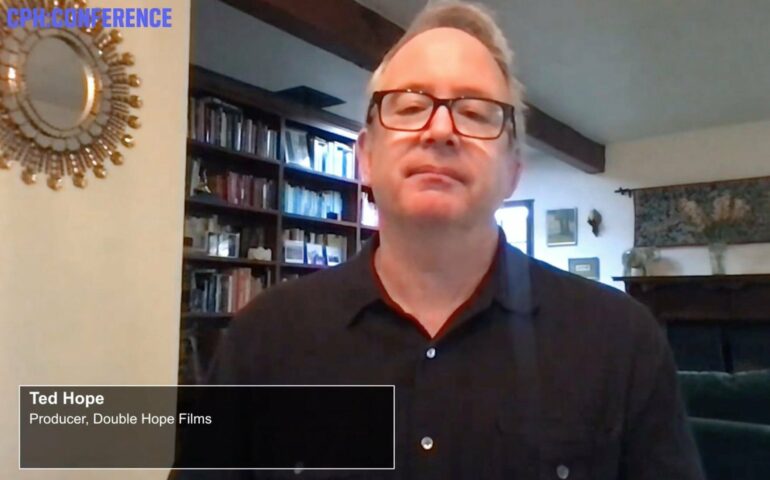WRITTEN BY: Annika Pham
The former Co-head of Movies at Amazon Studios, shared his views on US streamers’ modus operandi, and challenges ahead for documentary creators and the indie sector.
One of the most distinguished US indie producers, Ted Hope boasts a vast experience of producing and distributing more than 100 features and shorts in the 1990s, under The Good Machine label, credited among others for producing some of Ang Lee’s film gems, including Crouching Tiger, Hidden Dragon. After five years at Amazon Studios, Hope is back on the indie scene, with his own shingle Double Hope Films, and shared his views with CPH:DOX delegates.
Speaking on Tuesday at the online CPH:CONFERENCE on the topic: “Platform power play, what’s in for the future of the industry?”, the seasoned producer didn’t mince words. “What you see from looking at interfaces of global streamers is that that business is not about curation, discovery, adding value around a title,” he said. Streamers basically “promote the shiny and new”; they make sure “everyone likes what they get, not get what they like”. By aiming at the widest possible audience, they tend to commission “conceptual and high-concept content such as Tiger King or My Octopus Teacher. “
Pointing out as well at the difference between the theatrical and streaming environment, the US producer said “it’s not about profit and loss, but customer and acquisition”, therefore VOD platforms are looking at common denominators, “what the neighbour has.”
In such a context, Hope admits: “It’s a super challenge for us as creators. How do we continue to have an emphasis on quality, impact, uniqueness, and distinction in a world dominated by a [global streaming] system which wants the widest possible audience?”
For him the best alternative is therefore “in secondary platforms, where curation, discovery is offered.”
In a more positive note, the US executive voted “Best Independent producer” at the 2018 Locarno Film Festival, said that in the world of global streamers where “quantity, speed of operation and efficiency” rule, opportunities also abound. “There are tremendous opportunities for creators to own works in more substantial ways than ever before,” he said. “We can cooperate with other creatives, have more control of the type of work we make and licence, but this requires structural changes,” he noted.
Among the options ahead of current and future generations of creators, Hope who defines himself as a ‘holistic producer’, says that “looking at collective practices, addressing issues of sustainability are more important than ever. “
“We need to build alliances beyond borders in every way, ‘although we’re not particularly trained to do this,” he conceded. “We need to see how to collaborate outside our specific needs, across platforms, with other creators in different fields and environment,” he said.
Asked by Tine Fischer, head of CPH:DOX, if he feels that globalisation ultimately is a good thing, Hope said: “We have to constantly interrogate ourselves in terms of what we love and care about, as a lot can be lost quickly,” he said. Pointing out at his personal experience with Ang Lee’s The Wedding Banquet, which was initially rejected by the industry for being Taiwanese and gay-themed, before being embraced by all for those very reasons, he claimed that “specificity is the pathway to the universal.”
“Successful TV shows go beyond the specificity, but what we love is cultural diversity,” said Hope, underscoring the global success of foreign language content on the streamers.
“Access to global content will help us all recognise that we’re not either, or, but we are part of an entire spectrum that we can relate to. This is a key time to double down and maintain a cultural specificity, with national cinemas, and to empower those who come from different perspectives. Vitality of our industry depends on this,” he concluded.
